Clinton State Department Offical Reveals Details of Alleged Document Review
By Sharyl Attkisson
DailySignal.com
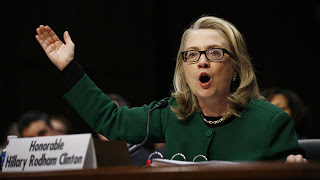
Hillary Clinton testifies
before the U.S. Senate Committee on Foreign
Relations on "Benghazi: The Attacks and the Lessons
Learned" in Washington, D.C., on Jan. 23, 2013.
(Photo: Ron Sachs/Newscom)
As the House Select
Committee on Benghazi prepares for its first hearing
this week, a former State Department diplomat is
coming forward with a startling allegation: Hillary
Clinton confidants were part of an operation to
“separate” damaging documents before they were
turned over to the Accountability Review Board
investigating security lapses surrounding the Sept.
11, 2012, terrorist attacks on the U.S. mission in
Benghazi, Libya.
New Benghazi allegation puts spotlight on
Hillary Clinton confidants, alleged after-hours
document review.
UPDATE: Hillary Clinton’s chief of staff allegedly
present at after-hours document review.
According to former Deputy Assistant Secretary
Raymond Maxwell, the after-hours session took place
over a weekend in a basement operations-type center
at State Department headquarters in Washington, D.C.
This is the first time Maxwell has publicly come
forward with the story.
At the time, Maxwell was a leader in the State
Department’s Bureau of Near Eastern Affairs, which
was charged with collecting emails and documents
relevant to the Benghazi probe.
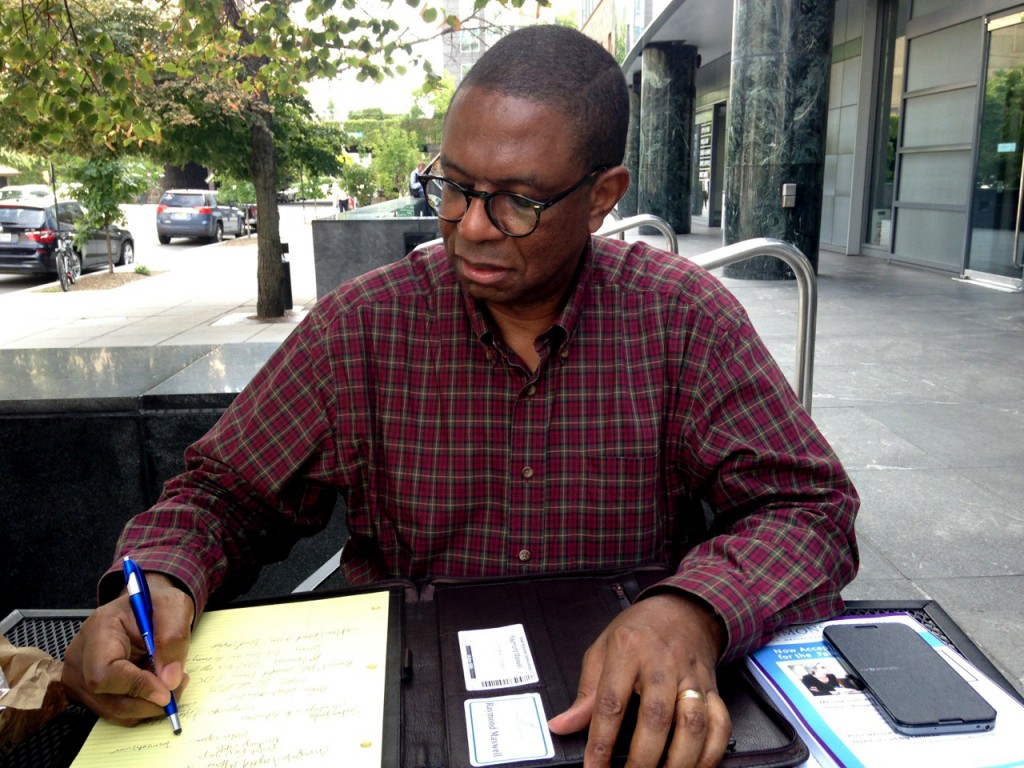
Raymond
Maxwell, former State Department deputy assistant
secretary (Photo: Sharyl Attkisson)
“I was not invited to that after-hours endeavor, but
I heard about it and decided to check it out on a
Sunday afternoon,” Maxwell says.
He didn’t know it then, but Maxwell would ultimately
become one of four State Department officials
singled out for discipline—he says scapegoated—then
later cleared for devastating security lapses
leading up to the attacks. Four Americans, including
U.S. Ambassador Christopher Stevens, were murdered
during the Benghazi attacks.
‘Basement Operation’
Maxwell says the weekend document session was held
in the basement of the State Department’s Foggy
Bottom headquarters in a room underneath the
“jogger’s entrance.” He describes it as a large
space, outfitted with computers and big screen
monitors, intended for emergency planning, and with
small offices on the periphery.
When he arrived, Maxwell says he observed boxes and
stacks of documents. He says a State Department
office director, whom Maxwell described as close to
Clinton’s top advisers, was there. Though the office
director technically worked for him, Maxwell says he
wasn’t consulted about her weekend assignment.
“She told me, ‘Ray, we are to go through these
stacks and pull out anything that might put anybody
in the [Near Eastern Affairs] front office or the
seventh floor in a bad light,’” says Maxwell. He
says “seventh floor” was State Department shorthand
for then-Secretary of State Clinton and her
principal advisers.
“I asked her, ‘But isn’t that unethical?’ She
responded, ‘Ray, those are our orders.’ ”
Did Hillary Clinton aides withhold damaging
Benghazi documents?
A few minutes after he arrived, Maxwell says, in
walked two high-ranking State Department officials.
In an interview Monday morning on Fox News, Rep.
Jason Chaffetz, R-Utah, named the two Hillary
Clinton confidants who allegedly were present: One
was Cheryl Mills, Clinton’s chief of staff and a
former White House counsel who defended President
Bill Clinton during his impeachment trial. The
other, Chaffetz said, was Deputy Chief of Staff Jake
Sullivan, who previously worked on Hillary Clinton’s
and then Barack Obama’s presidential campaigns.
“When Cheryl saw me, she snapped, ‘Who are you?’”
Maxwell says. “Jake explained, ‘That’s Ray Maxwell,
an NEA deputy assistant secretary.’ She conceded,
‘Well, OK.’”
Maxwell says the two officials, close confidants of
Clinton, appeared to check in on the operation and
soon left.
Maxwell says after Mills and Sullivan arrived, he,
the office director and an intern moved into a small
office where they looked through some papers.
Maxwell says his stack included pre-attack telegrams
and cables between the U.S. embassy in Tripoli and
State Department headquarters. After a short time,
Maxwell says he decided to leave.
“I didn’t feel good about it,” he says.
We contacted Mills and Sullivan to ask about the
allegations and the purpose of the described
separation of documents, but they did not return
calls or emails. We reached out to Clinton, who
declined an interview request and offered no
comment. A State Department spokesman told us it
would have been impossible for anybody outside the
Accountability Review Board (ARB) to control the
flow of information because the board cultivated so
many sources.
‘Unfettered Access’?
When the ARB issued its call for documents in early
October 2012, just weeks after the Benghazi attacks,
the executive directorate of the State Department’s
Bureau of Near Eastern Affairs was put in charge of
collecting all emails and relevant material. It was
gathered, boxed and—Maxwell says—ended up in the
basement room prior to being turned over.
In May 2013, when critics questioned the ARB’s
investigation as not thorough enough, co-chairmen
Ambassador Thomas Pickering and Adm. Mike Mullen
responded that “we had unfettered access to everyone
and everything including all the documentation we
needed.”
Maxwell says when he heard that statement, he
couldn’t help but wonder if the ARB—perhaps
unknowingly—had received from his bureau a scrubbed
set of documents with the most damaging material
missing.

An attacker
celebrates as buildings and cars burn at the
consulate compound in Benghazi late Sept. 11, 2012.
(Photo: Getty Images/Newscom)
Maxwell also criticizes the
ARB as “anything but independent,” pointing to
Mullen’s admission in congressional testimony that
he called Mills to give her inside advice after the
ARB interviewed a potential congressional witness.
In an interview in September 2013, Pickering told me
that he would not have done what Mullen did. But
both co-chairmen strongly defend their probe as
“fiercely independent.”
Maxwell also criticizes the ARB for failing to
interview key people at the White House, State
Department and the CIA, including not only Clinton
but Deputy Secretary of State Thomas Nides, who
managed department resources in Libya; Assistant
Secretary of State for Political Military Affairs
Andrew Shapiro; and White House National Security
Council Director for Libya Ben Fishman.
“The ARB inquiry was, at best, a shoddily executed
attempt at damage control, both in Foggy Bottom and
on Capitol Hill,” Maxwell says. He views the
after-hours operation he witnessed in the State
Department basement as “an exercise in
misdirection.”
Sullivan did not respond to emails or to messages
sent to him through his current teaching job at Yale
Law School. Mills did not respond to a message
passed to her through Black Rock, a major global
investment firm where she is on the board of
directors. Clinton’s press officer ultimately
referred us to the State Department, though none of
the three currently works there.
State Department Response
A State Department spokesman, Alec Gerlach, calls
the implication that documents were withheld
“totally without merit.” Gerlach says: “The range of
sources that the ARB’s investigation drew on would
have made it impossible for anyone outside of the
ARB to control its access to information.”
“The allegations are as serious as it gets,”
says one lawmaker of the alleged Benghazi document
review.
Gerlach says the State Department instructed all
employees to cooperate “fully and promptly” with the
ARB, which invited anyone with relevant information
to contact the board directly.
“So individuals with information were reaching out
proactively to the board. And, the ARB was also
directly engaged with individuals and the [State]
Department’s bureaus and offices to request
information and pull on whichever threads it chose
to,” Gerlach says.
Benghazi Select Committee
Maxwell says he has been interviewed privately by
several members of Congress in recent months,
including Chaffetz, a member of the House Oversight
Committee, and Rep. Trey Gowdy, R-S.C., chairman of
the House Select Committee on Benghazi.
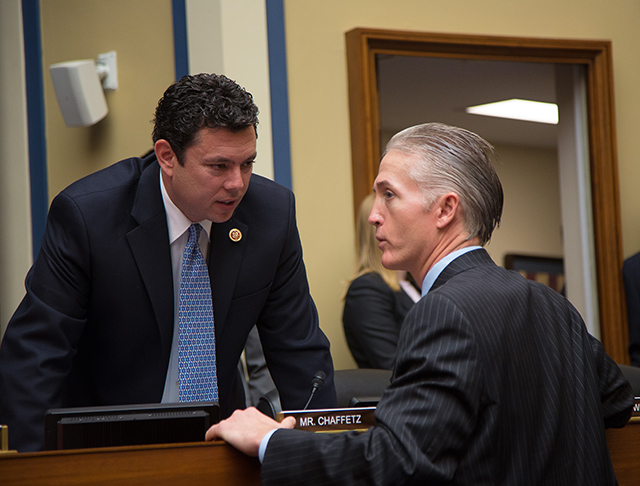
Rep. Jason
Chaffetz, R-Utah, speaks with Rep. Trey Gowdy,
R-S.C., chairman of the Benghazi Select Committee,
(Photo: Newscom)
When reached for comment,
Chaffetz told me that Maxwell’s allegations “go to
the heart of the integrity of the State Department.”
“The allegations are as serious as it gets, and it’s
something we have obviously followed up and
pursued,” Chaffetz says. “I’m 100 percent confident
the Benghazi Select Committee is going to dive deep
on that issue.”
Former Obama Supporter
Maxwell, 58, strongly supported President Barack
Obama and personally contributed to his presidential
campaign. But post-Benghazi, he has soured on both
Obama and Clinton, saying he had nothing to do with
security and was sacrificed as a scapegoat while
higher-up officials directly responsible escaped
discipline.
Maxwell spent a year on paid administrative leave
with no official charge ever levied against him.
Ultimately, the State Department cleared Maxwell of
wrongdoing and reinstated him. He retired a short
time later, in November 2013.
Maxwell worked in foreign service for 21 years as
the well-respected deputy assistant secretary for
Maghreb Affairs in the Near East Bureau and is a
former chief of staff to the ambassador in Baghdad.
Fluent in Portuguese, Maxwell is a Navy “mustanger,”
which means he successfully made the leap from the
enlisted ranks to commissioned officer.
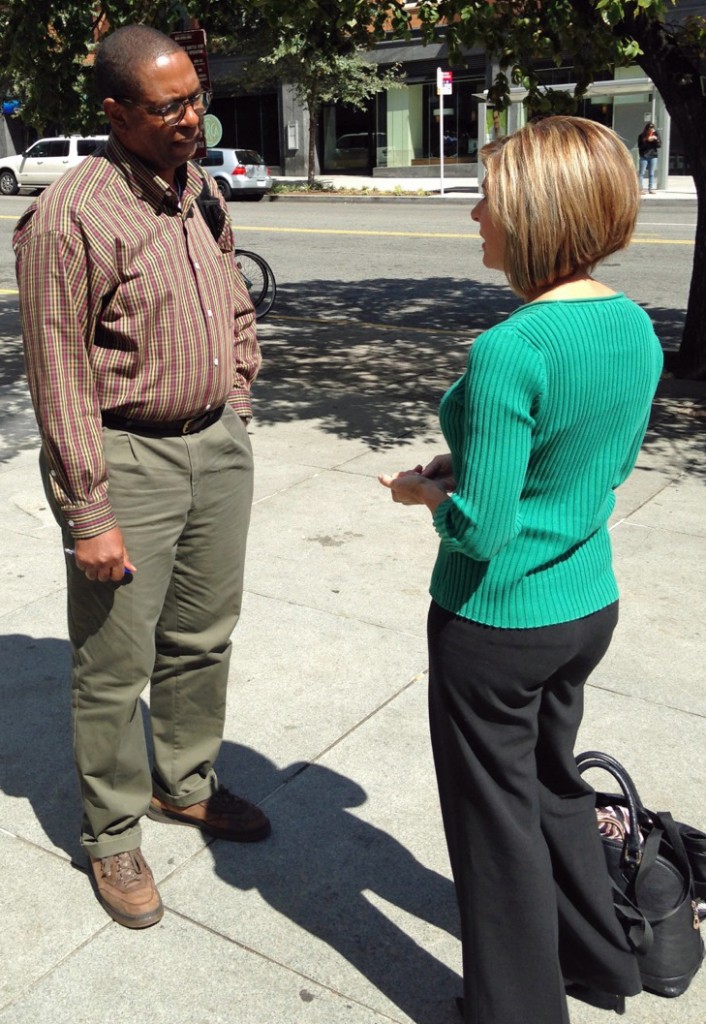
Raymond Maxwell
speaks with investigative correspondent Sharyl
Attkisson in Washington. (Photo: Courtesy Sharyl
Attkisson)
Maxwell also is a prolific
poet. While on administrative leave, he published
poems online: allegories hinting at his
post-Benghazi observations and experiences.
A poem entitled “Invitation” refers to his placement
on leave in December 2012: “The Queen’s Henchmen /
request the pleasure of your company / at a Lynching
— / to be held / at 23rd and C Streets NW [State
Dept. building] / on Tuesday, December 18, 2012 /
just past sunset. / Dress: Formal, Masks and Hoods —
/ the four being lynched / must never know the
identities/ of their executioners, or what/ whose
sin required their sacrifice./ A blood sacrifice — /
to divert the hounds- / to appease the gods — / to
cleanse our filth and /satisfy our guilty
consciences…”
In another poem called “Trapped in a purgatory of
their own deceit,” Maxwell wrote: “The web of lies
they weave / gets tighter and tighter / in its
deceit / until it bottoms out — / at a very low
frequency — / and implodes…Yet all the while, / the
more they talk, / the more they lie, / and the
deeper down the hole they go… Just wait…/ just wait
and feed them the rope.”
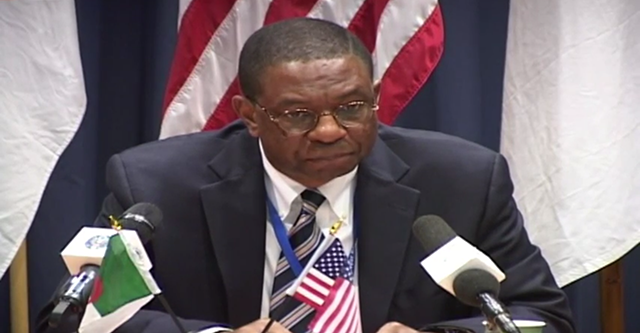
Maxwell in
Algiers in 2011 as deputy assistant secretary for
the Maghreb region. (Photo: YouTube via U.S. Embassy
in Algiers)
Several weeks after he was
placed on leave with no formal accusations, Maxwell
made an appointment to address his status with a
State Department ombudsman.
“She told me, ‘You are taking this all too
personally, Raymond. It is not about you,’ ” Maxwell
recalls.
“I told her that ‘My name is on TV and I’m on
administrative leave, it seems like it’s about me.’
Then she said, ‘You’re not harmed, you’re still
getting paid. Don’t watch TV. Take your wife on a
cruise. It’s not about you; it’s about Hillary and
2016.’ ”
Since retiring from the State Department,
Maxwell has obtained a master’s degree in library
information science.
@SharylAttkisson
Sharyl Attkisson
Sharyl Attkisson, an Emmy award-winning
investigative journalist, is a senior independent
contributor to The Daily Signal. She is the author
of the forthcoming book, "Stonewalled."
Learn more at
SharylAttkisson.com.
This is a Daily Signal special feature.

